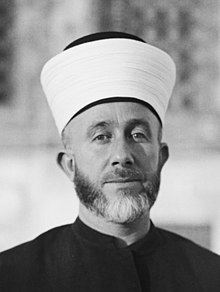Hajj Amin al-Husseini
| Amin al-Husseini | |
|---|---|

Amin al-Husseini (1929)
|
|
| Grand Mufti of Jerusalem | |
|
In office 1921 – 1937 |
|
| Preceded by | Kamil al-Husayni |
| Succeeded by | Hussam ad-Din Jarallah |
| President of the Supreme Muslim Council | |
|
In office 9 January 1922 – 1937 |
|
| Preceded by | Post established |
| Personal details | |
| Born |
c. 1895-7 Jerusalem, Ottoman Empire |
| Died | 4 July 1974 Beirut, Lebanon |
| Political party | Arab Higher Committee |
| Profession | Mufti |
| Military service | |
| Allegiance |
|
Mohammed Amin al-Husseini (Arabic: محمد أمين الحسيني;c. 1897 – 4 July 1974) was a Palestinian Arab nationalist and Muslim leader in Mandatory Palestine.
Al-Husseini was the scion of a family of Jerusalemite notables, who trace their origins to the eponymous grandson of Muhammad. After receiving an education in Islamic, Ottoman, and Catholic schools, he went on to serve in the Ottoman army in World War I. At war's end he stationed himself in Damascus as a supporter of the Arab Kingdom of Syria. Following the Franco-Syrian War and the collapse of Arab Hashemite rule in Damascus, his early position on pan-Arabism shifted to a form of local nationalism for Palestinian Arabs and he moved back to Jerusalem. From as early as 1920 he actively opposed Zionism, and was implicated as a leader of the 1920 Nebi Musa riots. Al-Husseini was sentenced to ten years' imprisonment for incitement but was pardoned by the British. In 1921 the British High Commissioner appointed him Grand Mufti of Jerusalem, a position he used to promote Islam while rallying a non-confessional Arab nationalism against Zionism. During the period 1921-36 he was considered an important ally by the British Mandatory authorities.
...
Wikipedia
